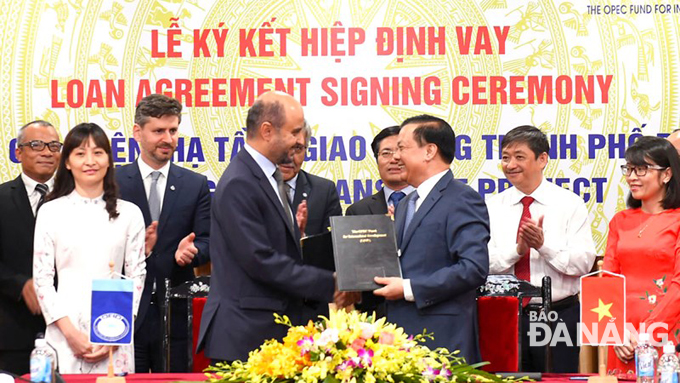45 million US$ loaned by OFID for city's transport infrastructure project
Vietnamese Minister of Finance Dinh Tien Dung and Mr Abdulhamid Alkhalifa, the Director-General and Chief Executive Officer of OFID - the OPEC Fund for International Development, have just signed a loan agreement worth 45 million US$ for the Da Nang Transport Project.
 |
| A view of the loan agreement signing ceremony |
Also attendance at the loan agreement signing ceremony which took place in Ha Noi on Wednesday morning were Da Nang People’s Committee Vice Chairman Dang Viet Dung and representatives of the Vietnamese ministries of Foreign Affairs, Finance, and Planning and Investment.
The project is expected to cost 61.37 million US$, of which 45 million US$ is loaned by OFID, whilst about 16.37 million US$ comes from Viet Nam’s reciprocal capital allocated through the Da Nang budget.
The Da Nang People's Committee is the projects’ governing body, whilst the city’s Management Board for the city's Priority Infrastructure Investment Projects is the investor cum implementing unit.
Under the already-signed project, focus will be on building about 14.3 km of a western ring road No 2 measuring about 44-48m in width, and constructing 38.5m-wide bridges along this route and such other technical infrastructure items as drainage and lighting systems, technical sewers, and trees.
Also, heed will be paid to building about 1.2 km of a road linking the Co Co Bridge and the intersection of Tran Dai Nghia and Vo Chi Cong streets, and a 100m-long section of a bridge crossing the Co Co River, connecting Vo Quy Huan Street and Vo Chi Cong Street.
The large-scale project is scheduled to be completed by the end of 2022, helping Da Nang develop transport infrastructure in a more effective and sustainable manner, thereby promoting the city’s socio-economic progress, enhancing residents’ living conditions, reducing traffic accidents, tackling environmental pollution and bettering locals’ travel conditions.